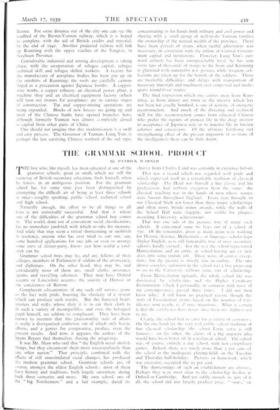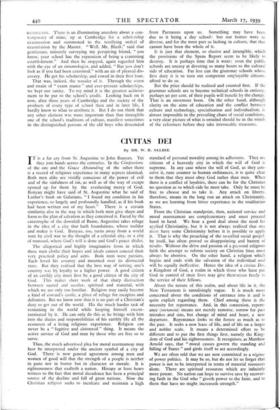THE GRAMMAR SCHOOL PROM ("r
By PATRICK NVARN
THE boy who, like myself, has been educated at one of the grammar schools, great or small, which are still the mainstay of British secondary education, finds himself, when he leaves, in an ambiguous position. For the grammar school has for some time past been distinguished by attempting the difficult art of being at least three schools at once—roughly speaking, public school, technical school and high school.
Naturally enough, the effort to be all things to all boys is not universally' successful. And that is where one of the difficulties of the grammar school boy comes in. The world, done out of convenient social classifications, has no immediate yardstick with which to take his measure. And while that may seem a trivial shortcoming or snobbish in tendency, anyone who has ever tried to sort out, say, some hundred applications for one job, or even to arrange some sorts of dinner-party, knows just how useful a yard- stick can be.
Grammar school boys may be, and are, fellows of their colleges, members of Parliament if seldom of the aristocracy, and diplomats. On the other hand, they may be, and considerably more of them are, small clerks. insurance agents, and travelling salesmen. They may have Oxford accents or Lancashire accents: the suavity of Harrow or the conciseness of Barrow.
Complacent educationists (if any such still survive, point to the fact with pride, boasting the elasticity of a system which can produce such reusits. But the harassed head- masters and staffs, whose duty it is to cut their cloth to fit such a variety of incompatibles, and even the befogged pupil himself, are seldom so complacent. They have been known to murmur that this praiseworthy state of affairs is really a disorganised confusion out of which only heroic efforts, and a genius for compromise, produce even the present results. And now, it appears, the authors of the Spens Report find themselves sharing the misgivings.
It was Mr. Shaw who said that " the English never abolish things, but they circumvent them more unscrupulously than any other nation." That principle, combined with the effects of still unassimilated social changes, has produced tha. modern grammar school. Grammar schools are, of course, amongst the oldest English schools: most of them have history and traditions, both largely unwritten, dating back three centuries and more. My own school, one of the " big Northerners " and a fair example, dated its charter from Charles 1 and was certainly in existence before. That was a record which was regarded with pride and which expressed itself in a remarkable tradition of classical scholarship. The Head was himself a fine classic and his predecessors had without exception been the same: the classical teaching was in the hands of men whose names were known throughout England. Every year brought to our Classical Sixth not fewer than three major scholarships and often more, beside minor awards, while the walls of the School Hall were (happily) not visible for plaques recording University achievements.
That was one side of the picture, true of many such schools. It concerned some 6o hoys out of a school of 75o. Of the remainder, about as many again were working for History, Science, Mathematics, or languages scholarships (higher English. as is still lamentably true of most secondary schools, hardly existed). For the rest the school represented Matriculation, and an entry, at school-leaving age c.r lust after, into some routine job. There were, of course, excep- tions; but the picture is strictly ;rue in outline. The one almost complete unknown in the school was a boy proposing to go to the University without some sort of scholarship.
From Matriculation upwards, the whole school life was dominated by scholarships and the Higher (len ificate Examination, which I personally, in common with most of
my contemporaries, passed three times. I did not then know why: I still know no practical reason, though the story of Government grants based on the number of Cer- tificates won yearly, is, if true, iniquitous. What is certain is that the certificates have never since been Inc slightest use to me.
Clearly, the school had to cater for a variety of customers. On the one hand lay the very real public school tradition of fine classical scholarship (the school Latin verse is still famous): on the other, the claims of a big majority who would have been better off in a technical school. The school was, of course, entirely a day school. with non-compulsory games. Indeed, there was rarely more than 5 per cent. of the school at the inadequate playing-fields on the Tuesday and Thursday half-holidays. Pictures or homework, which was excessive, occupied the 95 per cent.
The shortcomings of such an establishment are obvious. Perhaps they were most clear to the scholarship fresher at Oxford or Cambridge. And yet. oddly enough, in spite of it all, the school did not largely produce prigs. " swats," or autoir.vons. There is an illuminating anecdote about a con- temporary of mine, ' up at Cambridge for a scholarship examination and summoned to the terrifying ordeal of examination by the Master. " Well, Mr. Blank," said that gentleman, minutely surveying my perspiring friend, " you know, your school has the reputation of being a cramming establishment." And then he stopped, again regarded him with the eye of an entomologist, and added, " But you don't look as if you had been crammed," with an air of pleased dis- covery. He got his scholarship, and rowed in their first boat.
That was, indeed, the wonder of it. Through the stress and strain of " exam mania " and ever-present scholarships, we kept our sanity. To my mind it is the greatest achieve- ment to be put to the school's credit. Looking back on it now, after three years of Cambridge and the society of the products of every type of school then and in later life, I hardly know to what to attribute it. But I do not think that any other element was more important than that intangible one of the school's traditions of culture, manifest sometimes in the distinguished persons of the old boys who descended from Parnassus upon us. Something may have been due to it being a day school : but our homes were so diverse, and for the most part so lacking in culture, that that cannot have been the whole of it.
It is just that element, so elusive and intangible, which the provisions of the Spens Report seem to be likely to destroy. It is perhaps time that it went: even the public schools are uneasy at devoting so many hours to the cultural side of education. Far less can the grammar schools whose first duty it is to turn out competent employable citizens. afford to do so.
But the price should be realised and counted first. If the grammar schools are to become technical schools in entirety, perhaps 90 per cent. of their pupils will benefit by the change. That is an enormous boon. On the other hand, although clarity on the aims of education and the conflict between culture and technology, specialisation and individualism, is almost impossible in the prevailing chaos of social conditions, a very clear picture of what is entailed should be in the minds of the reformers before they take irrevocable measures.











































 Previous page
Previous page